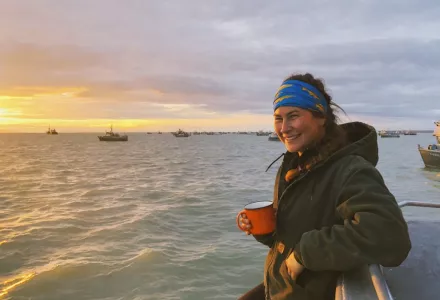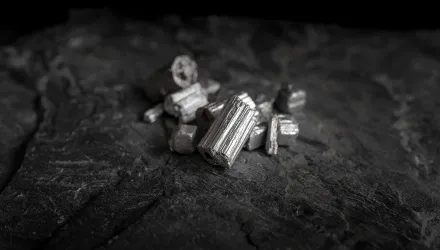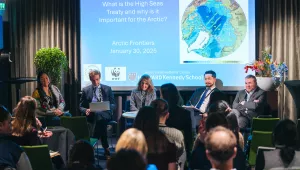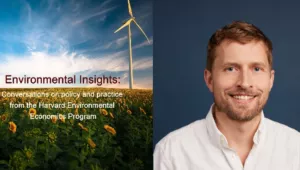Deenaalee Hodgdon is Deg Hit'an Athabaskan and Supiaq woman from the villages of Anvik and South Naknek, Alaska. She is currently in her final semester at Brown University where she concentrates in Anthropology and Public Policy. Last spring, Hodgdon interned at the Wilson Center's Polar Institute as a Brown In Washington Fellow where she worked on understanding U.S Arctic national security and the impacts of climate change as they pertain to Arctic Indigenous peoples. She has also worked as a cultural interpreter and raft guide in Denali National Park and is a currently a commercial fisherwoman in her home region of Bristol Bay.
Her intellectual pursuits and curiosities are primarily dedicated to sustainable fisheries, indigenous rights, climate justice, and Arctic resilience. Hodgdon is an activist academic, having participated as a water protector at Standing Rock, organizing around the Arctic Wildlife Refuge and the protection of Bristol Bay from the proposed Pebble Mine. She seeks to guide policy-making decisions with a more holistic and Indigenous approach and as a native woman rock climber, skier, and back country hiker, she hopes to increase visibility and inclusivity in the outdoors for Indigenous youth and people of color.
Ms. Gunn-Britt Retter lives in the coastal Saami community Unjárga-Nesseby in northeastern Norway. She is a teacher of training from Sámi University of Applied Sciences and holds an M.A. in Bilingual Studies from University of Wales. Since 2001, Retter has worked with Arctic Environmental issues, first at Arctic Council Indigenous Peoples' Secretariat (IPS) (Denmark) and since 2005, as Head of Arctic and Environmental Unit of the Saami Council. In her present position, Retter has been involved in issues related to Indigenous peoples and knowledge associated with climate change, biodiversity, language, pollution, and management of natural resources.
Raina Thiele is Founder and President of Thiele Strategies, a consulting firm that helps clients navigate public relations, coalition-building, business development, consultation, and project management. She focuses primarily on Indigenous, environmental/climate change, and international Arctic issues. Previously, she served in President Barack Obama's White House as Associate Director of Intergovernmental Affairs, where she focused on tribal governments and advised on climate change, Arctic, and energy issues. She was a lead organizer of President Obama's trip to Alaska in the fall of 2015. Thiele also served for nearly five years in the White House Office of Management and Budget, where she worked on tribal legislation, international affairs, and energy. She earned her Bachelor's Degree in Political Science from Yale College and her Master's in Public Policy degree from the Harvard Kennedy School. Thiele was born and raised in Alaska and is Dena'ina Athabascan and Yup'ik. She currently resides between Washington, D.C. and Alaska.
Moderator: Joel Clement is an Arctic Initiative Senior Fellow with a background in climate and energy issues, resilience and climate-change adaptation, landscape-scale conservation and management, and Arctic social-ecological systems. Prior to joining HKS, Clement served as an executive for seven years at the U.S. Department of the Interior. In September 2017, he was awarded The Joe A. Callaway Award for Civic Courage and resigned from public service in October of that year. Since then he has been on a national speaking tour and has received multiple awards for ethics, courage, and his dedication to the role of science in public policy. Before serving in the federal Government, Clement was the Conservation Science Program Officer for a private foundation in Seattle where he focused on climate-change adaptation strategies, landscape-scale conservation, and improving geospatial data-sharing capacity. In addition to his role at HKS, he is an associate with the Stockholm Environmental Institute and a senior fellow with the Union of Concerned Scientists.




